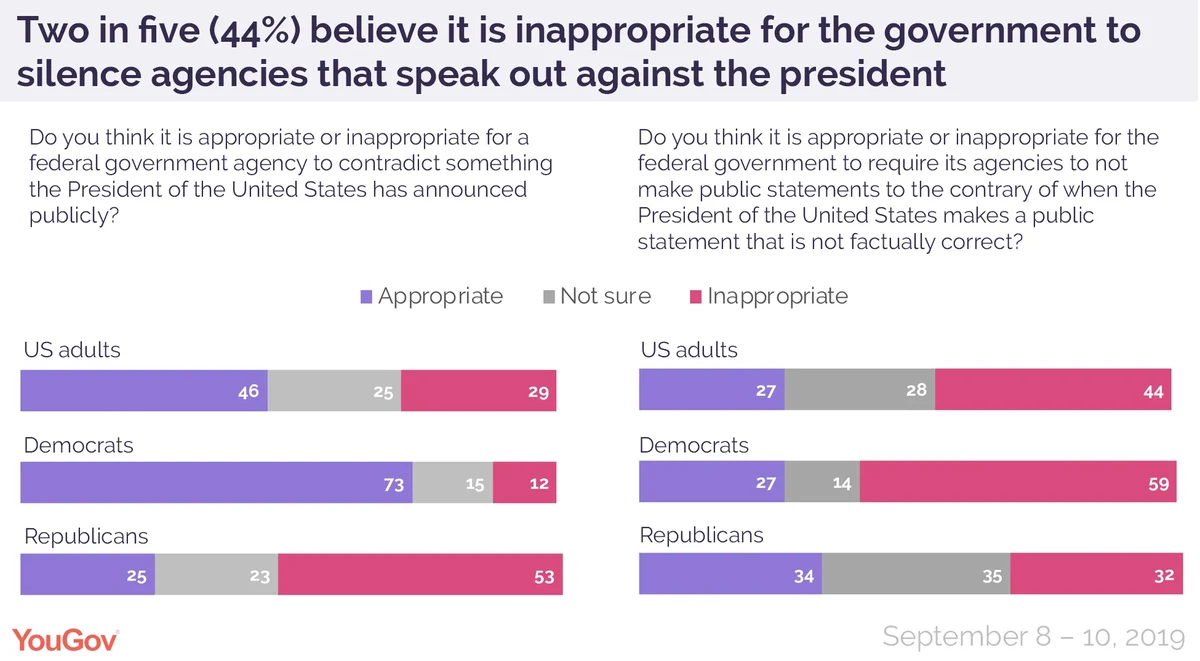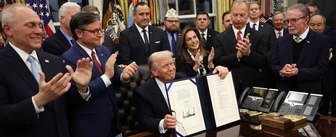President Donald Trump’s claim that Hurricane Dorian would be worse than expected in Alabama, followed by a correction from the Birmingham, Alabama, branch of the National Weather Service, NOAA office, followed by the appearance of an apparently Sharpie-altered map of the hurricane’s path and repeated claims by the President of the hurricane’s Alabama reach, followed by an unsigned statement from the National Oceanic and Atmospheric Administration office criticizing the Birmingham bureau’s original statement, all occurred before last weekend’s Economist/YouGov Poll was in the field. The discussion continued during the polling period.
The American public found it all quite difficult to evaluate. Should agencies correct presidential statements? By three to two, the answer was that this was appropriate, but since the question was asked at a time when a Republican is in the White House, the response was predictably partisan. Democrats (and to a lesser extent, independents) believe correcting a president is appropriate, while a majority of Republicans disagree.

But on a more specific question about an agency criticizing its employees for correcting a presidential statement that was factually incorrect, the party differences shrink. On this question, Republicans divide evenly.
There is a divide among Republicans when it comes to issues of severe weather and on climate change and how to deal with it. There are some measures taken by this administration that about half or more Republicans support: withdrawing from the Paris agreement, opening up the Arctic National Wildlife Refuge to oil drilling, opening coastal waters to oil and gas drilling, and allowing drilling on federal Indian land. But many Republicans are open to a large number of other environmental regulations, some of which have been or may be eliminated by the Administration, including requiring LED or fluorescent light bulbs, regulating where coal companies dump their debris, requiring oil and gas companies to report methane emissions, and setting water pollution regulations for fracking on federal and Indian land. On most of these proposals, the public overall is strongly in favor of environmental regulation.
Many Americans have had experience with severe weather. Nearly half the public (45%) have lived in areas with severe weather, with those in the South the most exposed. Six in 10 residents in the South say they have lived in such places. Of those who have lived in areas of severe weather, 36 percent (20 percent of the entire adult population) have had to evacuate their homes at least once. However, on most of the environmental questions in this poll, including those specifically on climate change, there is little difference between those who have experienced severe weather and those who have not. Party identification remains the most important predictor of opinion about weather and climate change.
More than half (51%) of the public overall says that hurricanes are more severe now than they used to be. Less than a third of Republicans agree. Those who think hurricanes are more severe now, Republicans and Democrats alike, are more willing than others to attribute any increase in severity to climate change. They are also more likely to see climate change as happening, and as something that human activity has helped cause.
Nearly two-thirds of the country believes that climate change is occurring, and that human activity is responsible for it. More than a third (37%) of Republicans agree, while nearly half recognize the existence of climate change but attribute it to other factors. Those who see a human cause are the most sure that their beliefs are right.
See the full toplines and tables results from this week's Economist/YouGov poll.
Related: Americans like Trump cautioning the nation about Hurricane Dorian, but not his doubling down
Image: Getty








